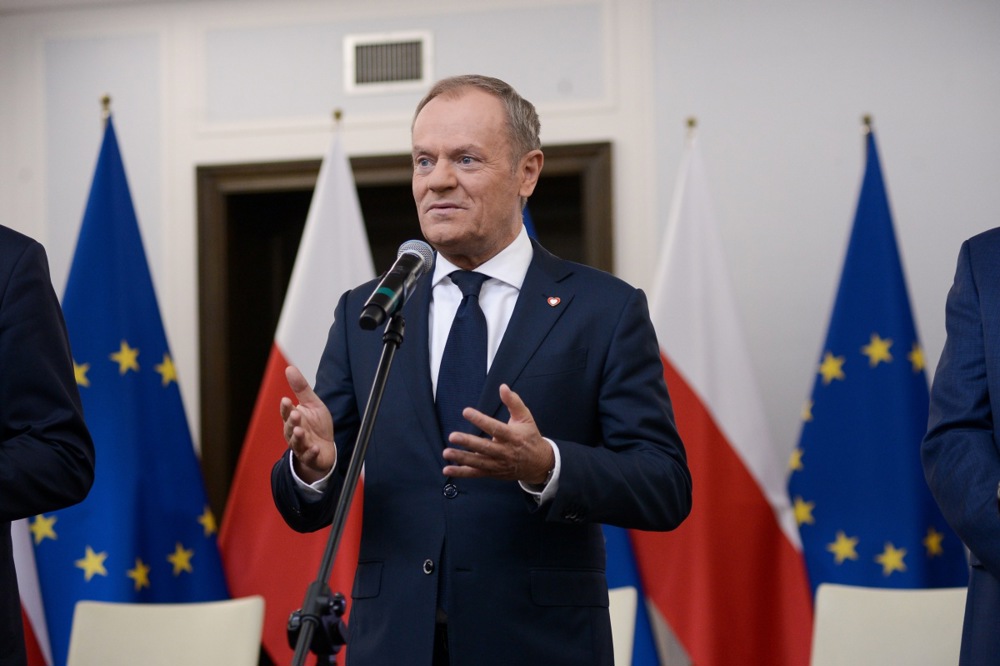The attempts to take Donald Trump’s name off the US presidential ballot and rumblings about banning the German AfD and Polish PiS parties could be the start of a new trend in western democracies.
It could result in them becoming, more rather than less, like the dictatorships they are committed to opposing.
With the US, European and British elections due, 2024 promises to be quite a year and definitely not a quiet one. It might well be the year in which we witness the unleashing of a trend for judicial activism rather than decisions at the ballot box determining the outcome of elections.
The decisions taken by the Colorado Supreme Court and the election official in Maine to take Trump’s name off the ballot paper for the upcoming Republican primaries look likely to be an overture to a long and protracted battle to force him out of the presidential race.
Even if the US Supreme Court rules that he cannot be prevented from running in the primaries, those who want to see him stopped from standing in the US general election will not give up. Armed with a score of indictments, even if not verdicts, they will try again before November’s ballot.
This is more likely the greater the support Trump secures in the primaries and the higher his, already buoyant, ratings are in the opinion polls. The Democrats may have worked out that the indictment strategy is not one that can halt him as it has in fact solidified rather than undermined support for him.
That is why to be sure of stopping Trump winning, they have to get him off the ballot. Even if that means at some stage this year having to make the reluctant US President Joe Biden agree to stack the US Supreme Court with additional judges to reverse the current Conservative majority. Once the Supreme Court is neutralised, the judicial activists at State level can do the rest.
Once the most powerful country in the world starts to behave in this way, others are bound to follow.
They may not like the fact they will get compared with the Putins of this world, who have for decades fixed elections by excluding opponents, but they will argue that they are trying to prevent “the enemies of democracy” seizing power and that their actions are the “lesser evil”.
A debate about banning the German AfD party is already under way. In December, Germany’s domestic intelligence agency classified the Saxony State branch of the AfD as a threat to democracy, a potential first step towards outlawing it outright as unconstitutional.
Although Germany has in the past exercised constitutional powers in the name of domestic security to rein in hardcore far-Right and far-Left forces, the objects in recent decades were marginal organisations that had no chance of coming to power, even at a municipal level.
The AfD is a different story as polls show it overtaking both the SPD and the Greens. This has led many in Germany to argue that the country should heed the lessons of the Weimar Republic and nip the growing movement in the bud now – before it’s too late.
Since the political class has failed to stop the march of what its mainstream calls these “populist’ and “far-Right” movements, judicial action is now the preferred solution. Especially since the road of imposing European Union sanctions that were levied against Hungary’s Prime Minister Viktor Orbán and the Polish conservative PiS cannot be applied to Germany.
In Poland, voices calling for the banning of PiS are still in the minority but they are present. For the time being the new coalition Government led by Donald Tusk has seized the public media from PiS and plans to do the same with the courts.
Tusk can do it without having to fear any international reaction. That was reserved for his predecessors when they did it.
It reportedly was the late US president Franklin D Roosevelt who made the often-quoted remark about the then-dictator of Nicaragua, Anastasio Somoza: “He may be a son of a bitch, but he’s our son of a bitch”. It has been used many times since in the context of justifying support for unsavoury regimes.
It is the kind of thinking that also applies to the EU – being prepared to look the other way at actions of governments if those governments are supportive of the policies currently in fashion in Brussels. Yet they are not prepared to look the other way when conservative governments that oppose “an ever closer union” preferring a Europe of nation states, get up to any mischief.
The case of Poland under PiS rule is instructive here. The European Commission, European Parliament and the European Court of Justice have been up in arms for years over the fact the last conservative PiS government had been imposing its stamp on judicial appointments.
There were countless numbers of resolutions and letters of admonishment but, more importantly, there were financial penalties and sanctions through the withholding of Poland’s post-pandemic EU funds.
Tusk came to power promising a return to the principles of the rule of law and on his promise the EC has said it is going to unlock the post-pandemic funds.
But, within eight days of coming to power, his Government has taken over Poland’s public media using the police and secret services and in a clear breach of legislation and constitutional practice.
The Government says it had to act against the public media because, eight years ago, it had been taken over by the then-ruling PiS and had been biased against Tusk and the parties that support him ever since. But the PiS took control of the public media using legislation rather than force.
The new Tusk Government did not even try to pass new laws on public media and then persuade President Andrzej Duda to sign it. It preferred to take control using the “commercial code”, which most lawyers in Poland agree does not apply directly to the public media that, in Poland, is regulated by separate legislation.
Much bigger battles between Tusk’s Government on the one hand and the Duda and the PiS on the other will take place over the judiciary, the head of the central bank – who Tusk wants to see the back of – and the likely prosecutions of former PiS state officials.
Perhaps most explosively of all, there may be wrangles about control of the military and foreign policy, areas in which the Constitution gives the President considerable power.
Some commentators believe that should the Tusk administration feel it is being blocked too strongly by Duda vetoing its legislation, it may try to remove him from office, or to ban PiS or, should the situation escalate, both.
The Polish Constitution makes it practically impossible to depose a president by Parliament but, if the present ruling majority succeeds in taking over the judiciary and public media by extraordinary means that by-pass legislation and constitution, why should it not do the same with the presidency?
Once you control the courts you can do anything. Ask Russian President Vladimir Putin; he uses judicial and State bodies to ensure no one who might threaten his rule can stand in elections and that all of his opponents that haven’t been exiled or killed can be sent to the gulag.
Judicial activists in the Western democracies are, essentially, politicians – the smarter ones who realised that being inside the judiciary ensures you better pay, more independence and considerably more power to change the way things work. The rule of law at both domestic and international level is being replaced by the rule of the “Iron Fist”.
Yet, if the judicial activists start determining who can stand in elections and who cannot, then people will have a right to ask in what way the countries they are living in differ that much from what is to be found in the likes of Russia or China.






Russia is a permanent existential threat to Poland. Can Tusk be trusted with its defence?